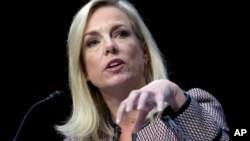U.S. President Donald Trump criticized Democrat lawmakers Tuesday, saying their demands to include protections for young undocumented immigrants in a bill that would prevent a government shut-down this week would cost the military.
The White House-congressional talks about the Deferred Action for Childhood Arrivals (DACA) program are linked to urgent meetings this week about funding to keep the government operating beyond Friday midnight, when current spending authorization expires.
Democratic leaders have said they most likely will oppose a measure that does not protect young immigrants known as “Dreamers,” including the nearly 800,000 who entered the United States unauthorized and received protection from deportation through DACA since its creation five years ago.
This has raised the ire of Trump, who again insisted the spending bill must satisfy his demands for tighter border security.
Deportation status
Even if legislators do not approve a program to protect the immigrants, deporting them will not be a top federal government priority, according to Department of Homeland Security Secretary Kirstjen Nielsen.
"It's not going to be a priority of the Immigration and Customs Enforcement," Nielsen told CBS News Tuesday. "If you are a DACA that's compliant with your registration, meaning you haven't committed a crime and you in fact are registered, you are not a priority of enforcement for ICE should the program end."
Despite Nielsen’s remarks, Trump has greatly expanded the categories of people who can be prioritized for deportation, a move immigration advocates say puts DACA recipients who lose their status at risk.
Nielsen's comments were made as the battle over an immigration agreement has been complicated by Trump's controversial remarks at White House meeting last Thursday.
Race issue raised
During an Oval Office meeting Tuesday with Kazakh President Nursultan Nazarbayev, Trump said he wants the U.S. to draw immigrants from nations around the world.
"I want them from everywhere," he said in response to a reporter's question at the end of the meeting about whether he wanted more immigrants from Norway.
Trump did not respond when asked if he wanted people to enter the country from "just Caucasian or white countries."
At a White House meeting last week, Trump reportedly referred to immigrants from Haiti, El Salvador and Africa as coming from "s---hole countries" and said he wanted more immigrants from countries such as Norway.
During testimony Tuesday before the Senate Judiciary Committee, Nielsen said she "did not hear" Trump use a certain vulgarity to describe African countries but added she doesn't "dispute the president was using tough language."
Democratic Sen. Dick Durban has not wavered from his allegations of Trump's profanity during last week's meeting in the Oval Office. "I stand by every word," he told reporters.
In an exclusive CNN interview that aired Tuesday, Durbin said, "We talked about the color of the skin of the people coming into the United States."
At one point after news surfaced about his remark, Trump tweeted, "Never said anything derogatory about Haiti. Made up by Dems. I have a wonderful relationship with Haitians. Probably should record future meetings - unfortunately no trust."
Trump’s reported remark has fueled Democrats' charges he is a racist. On Sunday, Trump denied he is a racist, telling reporters at his Mar-a-Lago resort in the state of Florida, "I am the least racist person you will ever interview."
White House Press Secretary Sarah Huckabee Sanders continued the narrative Tuesday, saying claims Trump is racist are "outrageous."
Senate Democratic Leader Chuck Schumer said Monday on CBS’s Late Show that Trump could demonstrate he is not a racist by signing an immigration bill that would protect young undocumented immigrants from deportation.
Trump is tying an extension of DACA, a temporary program championed by his predecessor Barack Obama, to funding for a wall he wants built along the U.S.-Mexican border.
Building a wall to stop further illegal immigration was a campaign promise Trump made during his successful 2016 run to the White House.
Many Democrats want extending DACA to be a separate issue from building a wall — something they oppose.
Last September, Trump signed an executive order ending DACA, but gave Congress until March 5 to weigh in on the issue.






